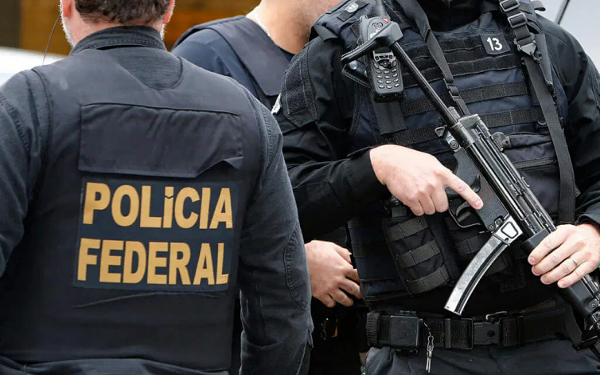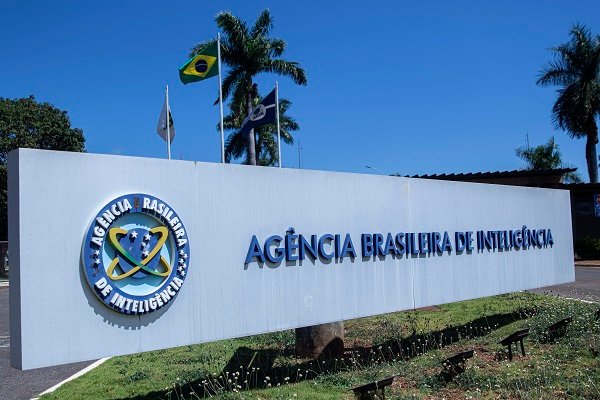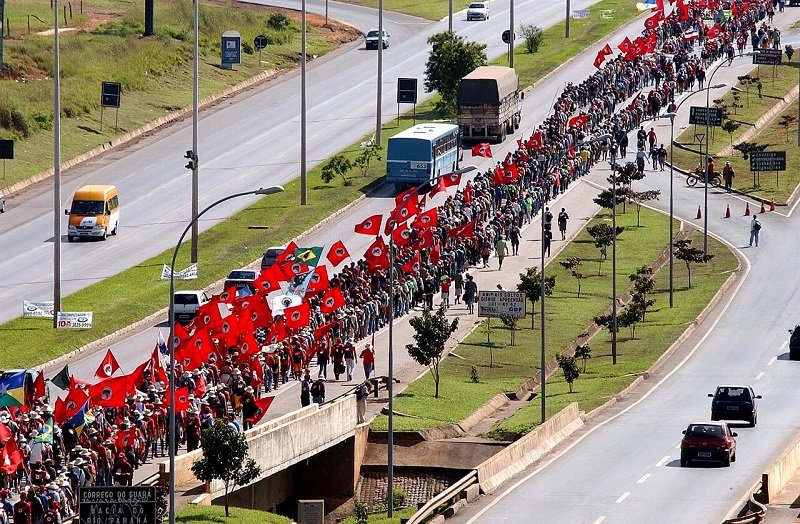Summary
In June and August, Brazilian security forces have carried out operations targeting terrorist cells of the Islamic State in national territory. This event brought the issue of terrorism in Brazil to the fore once again. Despite never having registered a terrorist attack, Brazil is a refuge for several criminals who try to recruit nationals. To address this problem, the Brazilian Antiterrorism Law was approved in 2016. The law was an improvement but should be tested against the country’s particular risks, like organized crime, and social and political movements, such as the one that led hundreds to storm the Congress and other important buildings in January 2023.
The Influence of Terrorism in Brazil
On 10 August, the Federal Police completed an operation against terrorism in Brazil. A series of search and seizure warrants were issued against a group that would be part of the Islamic State (IS). The individuals would recruit Brazilian teenagers for the organization. The warrants were served in the states of São Paulo, Minas Gerais, and Rio de Janeiro.
However, this is not the only recent incident reported, which shows that the influence of the Islamic State in Brazil might be stronger than previously thought. On 12 June, the Federal Police arrested a Brazilian who intended to leave the country to join the terrorist group Islamic State (ISIS). He was arrested at Guarulhos International Airport, in São Paulo, and intended to fly to Istanbul, Turkey. From there, he would head overland to areas still dominated by the radical group, in Iraq, Syria or sub-Saharan Africa.

However, this is not the only recent incident reported, which shows that the influence of the Islamic State in Brazil might be stronger than previously thought. On 12 June, the Federal Police arrested a Brazilian who intended to leave the country to join the terrorist group Islamic State (ISIS). He was arrested at Guarulhos International Airport, in São Paulo, and intended to fly to Istanbul, Turkey. From there, he would head overland to areas still dominated by the radical group, in Iraq, Syria or sub-Saharan Africa.
The phenomenon conventionally called terrorism is not new, has been going on for millennia. It is noticeable the fact that the term terrorism, despite being endowed with vagueness as to its meaning, was a term of convenience both to describe the violence of acts perpetrated by order maintenance forces and by those of destabilization. And, in fact, there is still no consensus on the definition of the term, not even in the United Nations, as there is no International Convention defining it. It is considered difficult to arrive at a consensual definition about this conception, since political, ideological, military, and religious ideas are involved.
When it comes to terrorism in the most popular sense, Islamic terrorism, Brazil has not yet registered any cases. According to The Global Terrorism Index of 2022, the nation is in 85th place, in a list of 99 countries evaluated, with a score of 0.599. The Global Terrorism Index measures the direct and indirect impact of terrorism, including its effects on lives lost, injuries, property damage and the psychological aftereffects. It is a composite score that ranks countries according to the impact of terrorism from 0 (no impact) to 10 (highest impact).
Brazilian Intelligence Agency Confirms Terrorist Threat Against Brazil
The closest Brazil came to be targeted by Islamic terrorism was in 2016, two weeks before the opening of the Olympic Games in Rio. At the time, the Brazilian Federal Police arrested an Islamic jihadist group that was planning attacks similar to those of the Munich Games in 1972, when Israeli athletes were kidnapped and killed. Ten suspected ISIS (Islamic State of Iraq and Syria, now II Islamic State) cells were arrested and two fled. The group even encouraged attacks by lone wolves against athletes from the United Kingdom, United States and France, suggesting the use of poison or explosives linked to drones, as reported by the British newspaper Daily Mail.

Also in 2016, the Brazilian Intelligence Agency (Abin) confirmed the authenticity of a profile and a message posted in November 2015. An alleged member of the Islamic State posted a threat to the country on Twitter (currently X). The message “Brazil, you are our next target” was posted in November 2015 by French Maxime Hauchard – ISIS high-ranking executioner -, shortly after the attacks that left 129 dead and dozens injured in France. The revelation made by Abin generated real concern. Both the Federal Police and Abin itself began to monitor an unknown, but relevant, number of people with suspected links to the terrorist organizations Al Qaeda and ISIS.
Until that moment authorities were only monitoring people who used the country as a refuge or were suspected of giving financial. After the threat posted on social networks, a lone wolf attack became a real concern. For the security forces, people not directly linked to extremist groups, but sympathetic to their cause could really carry out a terrorist attack.
Two years later, the Federal Police arrested the Lebanese Assad Ahmad Barakat in Foz do Iguaçu (PR) for suspicion of financing terrorist groups. And, well before that, in 2001, an investigation by Veja magazine showed that 20 individuals linked to Al-Qaeda, Hamas and Hezbollah were living in the country, spreading terrorist propaganda, collecting money, recruiting new members, and planning violent acts. Today, there are at least four cases of foreigners detained in Brazil accused of acting as supporters or facilitators of Islamic terrorism.
One of the strategies used by terrorists to seek protection under the wings of Brazilian legislation is marriage. They take advantage of women in fragile situations to get married, making it difficult for them to be expelled from the country. Single mothers are even more attractive targets, with the consequent adoption of Brazilian children.
Antiterrorism Law
Brazil’s antiterrorism law is recent. Due to the lack of high risks reported, the nation lagged behind countries most affected by this problem, like the US and European counterparts. The Brazilian regulation was issued in March 2016, just before the Olympic Games in Rio. For Giuliano Savioli Deliberador, PhD in State Law from the University of São Paulo (USP), the greatest advance of the Brazilian Antiterrorism Law is having a clear criminal type to define what terrorism is. Savioli recognizes that it is imperfect, but the fact that it exists facilitates Brazil’s insertion in the international fight against terrorism.
Law No. 13,260 defines that: “terrorism consists of the practice by one or more individuals of the acts provided for in this article, for reasons of xenophobia, discrimination or prejudice based on race, color, ethnicity and religion, when committed with the aim of provoking social or generalized terror, exposing people, property, public peace or public safety to danger”.
According to the norm, acts of terrorism are considered: to use or threaten to use, transport, store, carry or carry explosives or other means capable of causing damage or promoting mass destruction; sabotage the operation means of communication or transport, among others.
The Invasion of the Three Powers Square, Terrorism?
The attacks on the headquarters of the Three Powers in Brasília put the new law under test. The incident was called by the media and some authorities an act of terrorism due to the size of the destruction, the fear generated, and the violent means used. But, experts say that, in fact, the incident does not fit the definition of the law.

On 8 January 2023, supporters of the former President Jair Bolsonaro, invaded and destroyed the National Congress, the Federal Supreme Court (STF) and the Planalto Palace. They did not accept the elections’ result and would have attempted to start a coup against the new government by taking over the main buildings of the federal administration. Since the perpetrators refused to accept an institutional result legitimized by electoral authorities, this probably helped them be labeled as terrorists.
However, the accountability of the extremist attacks as terrorists comes up against the text of the law that defines the crime in the country, since they must be motivated by “xenophobia, discrimination or prejudice based on race, color, ethnicity and religion”, which was not the case in the specific incident.
On top of that, according to Diego Nunes, professor of criminal law history at the Federal University of Santa Catarina (UFSC), the law does not apply to the individual or collective conduct of people in political demonstrations, social, union, religious, class movements or professional category, which would be the case of the movement seen in the city capital.
Organized Crime, Social Movements and the Revision of the Antiterrorism Law
After the destruction that took place in Brasília, the government proposed a series of changes in laws to tighten the repression of violent political demonstrations. The initiative aims to change the current law to classify participants of movements of any ideologies that lead to violent acts as terrorists.
The politically motivated incidents are not the only elements creating pressure for a reform of the antiterrorism law. There is a movement in Congress for the approval of a bill that equates some conducts by organized crime groups with terrorism.
The text gained momentum in the Senate after a series of attacks in Rio Grande do Norte in March of this year. At least 300 incidents were reported within eight days. The attacks targeted public buildings, businesses and vehicles, and were ordered by the Crime Syndicate, a local criminal faction. They were motivated by the transference of leaders of this group detained in state prisons, and better conditions inside the facilities.
Waves of attacks perpetrated by the criminal organizations are neither a rare nor a new phenomenon in Brazil. In fact, they are an already known tactic committed by almost all gangs in all Brazilian states to spread fear and create public pressure over the governments for them to negotiate with the criminals.
However, transformations in the Antiterrorism Law has motivated criticism and concerns. For instance, the National Association of Federal Police Delegates (ADPF) understands that the text under analysis in Congress, entails the classification of numerous common crimes as terrorist acts. According to the ADPF, the bill causes legal uncertainty in the interpretation of the norm and can even generate an enormous number of investigations, overloading of the Federal Police (PF) and the Federal Justice.

For their turn, leaders of social movements believe that such changes can lead to the criminalization of their groups, and restrictions of civil rights and liberties. Brazil has a large number of social movements connected to historical social demands. The most famous are the Homeless Workers Movement (MTST) and the Landless Rural Workers Movement (MST). The first seeks adequate housing for its members living in urban areas, while the second fights for agrarian reform and the distribution of arable land for its members. To pressure the government and accelerate the development of their demands, they use many strategies, including the invasion of private property.
Generally, the invasions target allegedly unproductive lands and unoccupied buildings. The MST, for instance, justify its actions on the constitutional principle that establishes the social function of land in Brazil. But farmers commonly declare that the invaded lands were productive, in addition to claiming that the movement committed other crimes, like violence, destruction of private property etc. For them, the invasions also create legal uncertainty since private property would not be respected. This explains why this category lobbies for the movement to be considered as terrorist.
Brazil, a Particular Scenario
Recent discovery of Islamic terrorist operations in the country may represent an alert to the permeability of Brazil to this type of problem. Even though the country’s history and diplomatic stance do not make itself an attractive target for terrorism, it could be used to hit foreign asset and personnel located in its territory.
The Olympic experiences made the nation advance, by creating the conditions for the approval of its Antiterrorism law, an advance in terms of international standards. However, it is clear that the country has a particular social scenario that forced legislators to rethink the regulations, for them to remain updated, relevant, efficient, without curtailing civil rights.
Furthermore, the reflection on the definition of terrorism shows that, despite not being a primary target of Islamic terrorism, the country has its own security issues, quite complex and damaging, to deal with.




